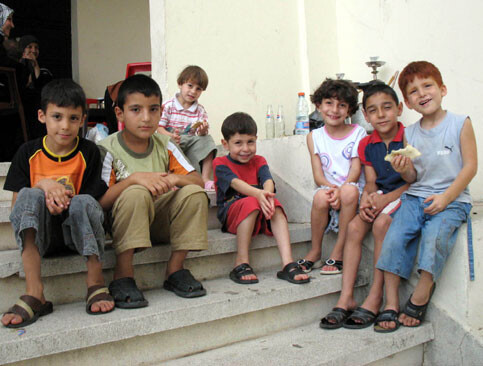United Nations Children's FundWorld Health Organization 19 July 2006

Displaced children from the south of Lebanon staying in a school in Ashrafiyeh, Beirut (Maire Claire Feghali/IRIN)
UNICEF and the World Health Organization (WHO) today expressed serious concern about civilian casualties and new risks to health from escalating violence in Lebanon and Israel:
Civilian deaths include dozens of children, with many more injured. The psychological impact is serious, as people, including children have witnessed the death or injury of loved ones and destruction of their homes and communities.
In Lebanon alone, more than 200 people have been killed and more than 550 injured. Hundreds of thousands of people are reportedly internally displaced, with more than 30,000 finding refuge in schools and public gardens in and outside Beirut.
The movement of medical supplies and ambulances to the affected areas is seriously curtailed. Unobstructed access for humanitarian assistance is critical to stave off needless death and suffering. The protection of civilians during conflict is an obligation under international humanitarian law. Unhindered humanitarian access to health facilities for the injured, for those who need care for chronic conditions, and for pregnant women, is equally critical to the prevention of more civilian deaths in this crisis.
WHO and UNICEF are working with a broad range of partners in Lebanon to save lives, protect civilians, and to support basic services such as health, water and sanitation, education and psycho-social care. The agencies, in coordination with the Ministry of Health, are providing emergency medicines and supplies for acute and chronic conditions. This includes medicines required for chronic illnesses, such as cardiovascular disease and diabetes - both of which are highly prevalent in Lebanon. The agencies are providing chlorine tablets in order to ensure safe drinking water and prevent water borne diseases.
The agencies are also ensuring distribution of fortified nutritional packs, micronutrients and oral rehydration solutions to ensure proper child and maternal health. WHO is conducting health assessments with national authorities to identify the most urgent health needs and gaps. UNICEF is supporting the pre-positioning of a number of generators in key health facilities throughout the southern parts of the country, along with sufficient levels of fuel reserves, so that health facilities can continue functioning.
In addition, UNICEF and WHO are part of the larger UN appeal which will be released next week, and includes funding for the next three months for:
UNICEF
WHO
Related Links